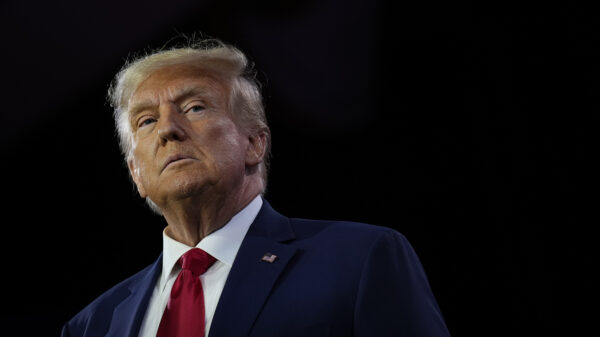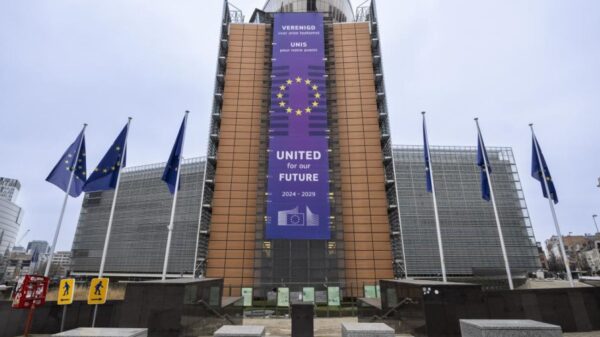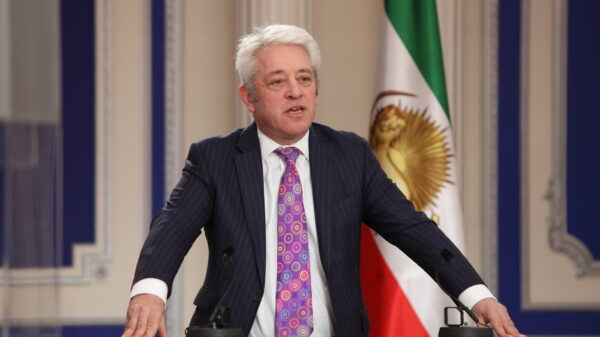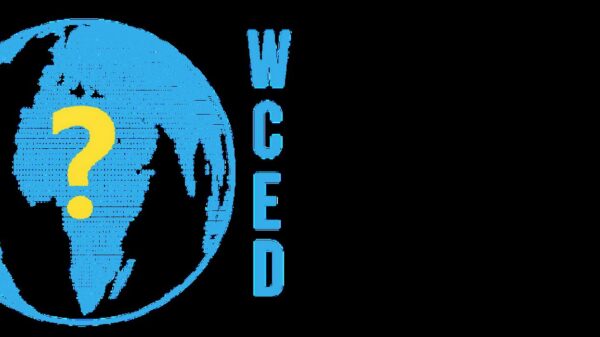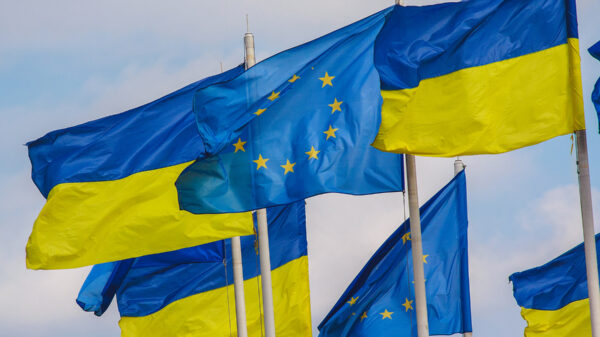 BBC
BBC“Everybody’s nervous – because they simply don’t know what he is going to do.”
That is the basic truth about Trump for governments, business bosses, military chiefs, and maybe you feel it too as he gets ready to make his incredible political comeback official.
He will take the Oath of Office for the second time on Monday, becoming the most powerful man in the Western world and in charge of the UK’s biggest trading partner. Soon after, he can sign executive orders that might affect how the UK makes a living or defends itself.
The range of risks is enormous. The opportunities are too.
Trump and his team are different this time round, more prepared, with a more aggressive agenda perhaps, but his delight in keeping the world guessing seems undimmed. It’s this uncertainty accompanying Trump that Whitehall and Westminster find so shocking.
How can the UK prepare for what it can’t yet know?
Stay out of the circus
A small group of senior ministers has been trying.
There have been series of secret “mini-cabinet” meetings, with the Prime Minister Sir Keir Starmer, the Chancellor Rachel Reeves, the Foreign Secretary David Lammy, and the Business Secretary Jonathan Reynolds “trying to plan for what might come”, according to one source.
One insider tells me there hasn’t been too much preparation for multiple specific scenarios because “you’d drive yourself crazy” trying to guess Trump’s next steps. But another source says various papers have been prepared to be presented to the wider Cabinet.
I’m told the focus has been “looking for opportunities” rather than panicking about whether Trump might follow through on some of his more outlandish statements, such as annexing Canada.
The PM’s picked one of Labour’s wiliest operators as his voice in DC, Lord Mandelson, who on Friday chose to write a piece for Fox News, Trump’s favourite news outlet. He was incredibly rude about Trump in the not-so-distant past but now heaps praise on him – and he’s not the only Labour figure to change his tune.
(As we revealed in our newsletter on Thursday, sadly for Jock and Poppy, Mandelson’s border collie and schnauzer, the Foreign Office travel budget won’t stretch for them to travel to DC in canine style on the Queen Mary 2 ocean liner.)
The government might not have been in power during Trump’s last term, but in Westminster, and in the City, there’s a universal memory of his late-night social media posts causing frenzies.
There is a determination this time round to stay out of the circus.
One senior figure says diplomatically: “We will be calm and nimble.”
With less politesse, another source who’s dealt with Trump said: “Trump is going to say things that make Labour MPs mad – don’t brief that the PM is personally upset. Put your big nappy on and ignore it.”


Keeping us safe – and anxiety about ‘nightmare scenario’
The hallmark of the relationship with our “chief ally”, as described by a senior government source, is helping keep each other safe. At a time of unique instability around the world, the number of unknowns are deeply uncomfortable for Westminster and other allied capitals.
There is no question the intelligence and security relationship is incredibly close and was maintained during Trump’s first term – despite some pretty big surprises at the UK end.
One source remembers that “the biggest jaw dropper was after the Salisbury attacks”, when two Russian agents used the nerve agent Novichok on the streets of the UK. President Trump was at Chequers with then-PM Theresa May and her team, and seemed reluctant to take the attack as seriously as the UK was demanding.
One of those present explains: “We were arguing about how bad and destabilising that was – he asked why. We said a state with nuclear weapons had used this on the soil of another state with nukes, and he said, ‘I didn’t know the UK had nuclear weapons’.”
But during that first term, despite Trump’s seeming threats to NATO, his bellicose rhetoric did push more European states to cough up extra cash for defence. The Abraham Accords were signed, though those agreements did not, as Trump boasted at the time, achieve a lasting peace in the Middle East. But they did mark progress.
There is, though, inside government, genuine anxiety about what’s described as the “nightmare scenario”.
If the US cuts support for Ukraine, emboldening Russia, Europe might not agree about how – or if – to fight. That could leave Nato, the western defence alliance, split and fundamentally weakened. Sources question, however, whether this would really serve Trump’s interests. After all he needs allies and a united West to combat China, America’s biggest rival.
While grappling with the unpredictability – Trump’s wild half-threats of making Canada the 51st State or grabbing Greenland – sources inside government also spot opportunities. One senior figure says: “In Ukraine and the Middle East there are options opening up. We need to partner so as to influence what the US does in these foreign policy priorities.”
This week, I interviewed the former secretary general of Nato, Jens Stoltenberg, who echoed that sentiment.
He told me: “[Trump] has language and a way of expressing himself which sometimes creates uncertainty, creates some noise, and I think that our main task – friends and allies – is then to find ways to deal with that uncertainty in a way that minimizes the risks to all of us.”
Sources point to a weaker Iran, progress towards the ceasefire between Gaza and Israel, and a growing sense that both sides want to bring the Ukraine conflict to an end. Trump’s bravado about ending the war in a day has already softened to a three-to-six-month ambition and “there’s no sign of a rush to abandonment now”, says one insider.
But there is a sense in Kyiv and Whitehall that a negotiation is coming. The UK’s hope is to help shape America’s approach rather than panic about the US upping sticks.
Stoltenberg is also urging Trump to continue the supply of weapons to Ukraine so as to strengthen its position in any future negotiation with Putin.
“The paradox is that weapons to Ukraine is the path to peace in Ukraine,” he added.
And while the government is miles away from accepting anything like Trump’s demand to increase defence spending to 5%, there is a private acknowledgement at senior levels in Whitehall that his demand for Europe to spend more of its own money on defence in Europe is not entirely illogical – and it’s helpful to those making the case for more cash on defence here.
Economic nerves
While some hedge fund traders might cash in from the kind of volatility Trump might create, there are plenty of nerves in other parts of the economy.
That’s partly down to his tendency to sound off. A City source says: “You’re always heart in mouth, waiting for the next wacky idea, or for him to say something crazy that is going to impact your business, a $10bn deal that’s on the slate, and you are three quarters of the way there – suddenly he’ll say something that can make it fall to bits overnight.”
And it’s not just his late-night online posts causing worry. One of his sells to the American public was to help those trading at home by putting taxes on imports, or tariffs, making it much more expensive for other countries to sell into the States.
But as the IMF warned yesterday, slapping extra tariffs on other countries could hit them hard, and impact the rest of the world’s earning power.

 Getty Images
Getty ImagesIn Cabinet there’s awareness of how big a departure it would be if Trump goes as far as he has suggested. One minister told me: “It’s a huge moment of history – American pledging a different way of doing business to what’s essentially been in place since the second world war.”
China and the EU, the other two big trading blocs, would be likely to answer back which could lead to “huge ramifications of a global trade war”, the minister acknowledges.
Another senior figure warns the UK might struggle to be relevant in a bust up on that scale, saying there’ll be an “arm wrestle between the three – they won’t pay the UK or our interests very much attention”.
As Trump, with the help of Elon Musk, looks to roll back regulation and cut tax, a City insider suggests the UK could fall out of favour because Trump’s ambition is to build a very different economy to ours, and that could create a tension of its own.
But another City insider points out that the stock market is “one of the metrics he cares most about”, and that it is driven by the big tech companies, many of whom depend on selling into China. “The love affair with the tech bros mean he’s not going to want to undermine too much of that,” they said.
Leader to leader
Whether it’s on the economy or Ukraine or any other issue, the relationship between president and prime minister will be absolutely crucial.
Starmer and Trump could hardly be more different. A lawyerly leader known as “Mr Rules” versus a man who is a convicted felon and has made a career out of behaving as if rules don’t apply to him.
A No 10 source says forget all the noise, and points to the two men meeting in autumn and holding three phone calls since. “It is the direct conversations that really matter – whatever Trump’s personal style it’s clear the substance is there,” they say, adding that the PM’s calm temperament helps.
But others who’ve dealt with Trump in government, and been on calls with Trump and previous prime ministers, warn how difficult it can be. “On a good day, fantastic, on a bad day, you’d be crouching,” one source said.
Another former official who was part of meetings with Trump and Boris Johnson said “they were like two silverbacks wrestling”, making staff listening in next door cry with laughter. Johnson would “flatter him obsequiously” to get what he wanted.
The official was also on calls between Trump and May. These were totally different, with “more than a whiff of misogyny, he would shout over her” and talk about the Queen or invite her to play golf, rather than discuss tricky subjects May wanted to raise.
They believe handling Trump will be Sir Keir’s biggest challenge: “We sent him a vicar’s daughter, then a pirate who knew how to handle him, now a human rights lawyer,” they say, adding “it’s not going to work in a world increasingly like the time of 1930s strong men”.

 Getty Images
Getty ImagesWhatever happens behind closed doors, as America’s closest ally, defending Trump’s decisions could be incredibly uncomfortable for the prime minister.
A former No 10 official says: “If Trump says there’ll have to be partition in Ukraine, Boris will say awful, others in Labour will say awful, but if Starmer won’t sell it in Europe, Trump will take offence and he will punish him.”
Starmer’s allies are more sanguine that “the politics don’t have to match for the relationship to be a success”.
And a success is what they must hope for. It is no secret Labour would have preferred the Democrats and some staff even went to bang on doors for Kamala Harris.
The question for government is how to influence Trump to get what the UK wants, and how to keep its head when the inevitable dramas arrive.
A foreign policy insider told me: “It might come at a price, but it is in our interest for him to be a success, not be cantankerous.”
The incoming president is perhaps both an emblem and a product of the changed and uncertain times we live in. As one minister says, “it’s all gone in Trump’s direction”.
It is impossible to be sure what Donald Trump, mark two, will do. But after his incredible comeback, and months of nerves on both sides of the Atlantic, we don’t have long to wait.
BBC InDepth is the new home on the website and app for the best analysis and expertise from our top journalists. Under a distinctive new brand, we’ll bring you fresh perspectives that challenge assumptions, and deep reporting on the biggest issues to help you make sense of a complex world. And we’ll be showcasing thought-provoking content from across BBC Sounds and iPlayer too. We’re starting small but thinking big, and we want to know what you think – you can send us your feedback by clicking on the button below.

